THE RENAISSANCE MAN OF ITALIAN CUISINE
Interview ©2013
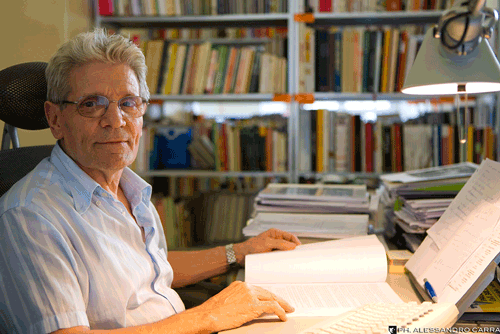
Born in Brescia, Marino Marini is a chef, journalist, food historian, and book collector. Since 2004 he has been the librarian of ALMA, the International University for Chefs and Sommeliers, founded that same year by the world-famous chef Gualtiero Marchesi in Colorno near Parma.
In November of last year Orme/Tarka published Marini’s latest book entitled Le Cucine di Parma: Storia e Ricette (The Cuisines of Parma: Their History and Recipes). It is part of the series of more than 40 volumes conceived by Franco Muzzio, which deals with a well-documented journey to discover the most truthful and deeply rooted gastronomic identities. Marini’s first book, La Cucina Bresciana (Brescia’s Cuisine) was published in 1993. One of the founders and for many years a manager of the international movement Slow Food, he launched its guide Osterie d’Italia and is the author of Osterie di Lombardia: Cremona e il suo territorio (The Taverns of Lombardy: Cremona and its Territory).In 2010 his book, La Gola (The Throat), won the prestigious Bancarella prize for a “cookbook.”
When I told him the title of this interview he protested saying: “The title is exaggerated. My job is only to link a citizen to his or her territory, so that he or she is aware and proud of being Italian at a time in our history of deep skepticism and mistrust.”
Our tastes in food are closely connected to our childhood; what are your first memories of food?
MM: My grandmother cooked gnocchi; she served them with a sauce of crushed stir-fried lard. She didn’t know it, but she was making “texture.”
Your first profession was chef; when and why did you decide to become a chef?
MM: My mother owned a series of restaurants and even a hotel. I oversaw the dining room, but couldn’t wait to work in the kitchen, so I went to hotel school after I’d received my diploma in another field of studies.
I found only a short summary of your career up to now on the Internet. Can you give me more details?
MM: My career has alighted on numerous aspects of the highest level of gastronomy in the area around Brescia and Lake Garda as well as elsewhere. For example I worked at Francesco Wührer’s famous restaurant and then in many others like the Grand Hotel Des Alpes in Madonna di Campiglio. To tell the truth I’m a multi-faceted chef because I have a passion for literature and politics besides for cooking, not to mention a strong commitment to making our society better than the one we were born into. Have we succeeded? I don’t think so.
Who were your mentors and what did you learn from them?
MM: Whenever I’m asked this question, I most frequently mention my grandmother. She taught me how to reason and to stick with my own conclusions, not to be influenced by others, to have the courage to defend my choices, and not to regret my mistakes.
What are the essential qualities of a top chef?
MM: The most important quality for a top chef, but also for any man or woman, is modesty and respect for others, especially when you don’t agree with their ideas. A great chef must understand the importance of his or her team and teamwork: the kitchen, the dining room, room service, reception, the wine cellar, and storerooms etc.
Other chefs that you’ve admired?
MM: Many starting with Gualtiero Marchesi whom I met many years ago in Milan. Through my work here at ALMA I’ve met many extraordinarily talented chefs: Pino Cuttaia, Antonino Cannavacciuolo, Antonella Ricci, Herbert Hinter, Pietro Leemann, Isa Mazzocchi, Nadia Santini, just to name a few. What I admire most in each of them is their attachment to their roots, their careful analysis of their territory’s traditional cuisine and their adaptations to it yet maintaining deep respect for the ingredients.
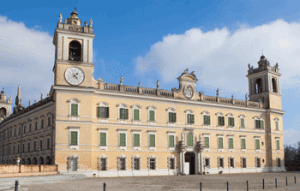
ALMA
As a Renaissance Man of Italian cuisine: chef, restaurant owner, food historian, author, cookbook collector, and librarian, which of these various professions have you liked best during your career?
MM: As I’ve already said I’m multi-faceted or, if you think it more appropriate, I’m eclectic and versatile. You go ahead and choose the best profile for me. As far as I’m concerned the most important thing that ever happened to me was the opportunity to contribute to the development of the Slow Food movement. I devoted ten years of my life to this project and launched the annual guide Osterie d’Italia, or Italy’s Taverns.
What aspect of your present profession as librarian of ALMA, and writer, do you like the best?
MM: I don’t think of myself as a writer. Through my books I try to bear witness to my times, to popularize historical anecdotes so as to better understand gastronomy. The most special aspect of being a librarian is my rapport with young people, discovering their curiosity and their hopes.
The least?
MM: Observing a lack of interest, unpreparedness, and the absence of curiosity when it concerns culture.
What’s your culinary philosophy?
MM: A light cuisine, without excessive frills, a cuisine that respects both cooking times and seasons, something many chefs claim to do, but few really do. To better explain what I mean, recently, in November, I found on the plate in front of me both tagliatelle with asparagus and risotto, with porcini mushrooms. Asparagus aren’t in season in November.
You were a founder of Slow Food; can you describe its beginnings?
MM: It was an extraordinary cultural experience. We made producers and food artisans understand that the route of quality was the only way of resisting the attacks of the multi-nationals. It was essential and still is to recognize the knowledge of high quality agricultural products accumulated over the centuries, and to promote them. That’s whatTerra Madre is all about; it’s a worldwide network that demonstrates that food is the constant of the farmer’ world; that, when a human being eats, he or she is carrying out an agricultural activity; that the political choices for agriculture will determine the future of mankind; that food has a value and that it should not be underrated; that water and seeds belong to everyone and should not be commercialized and sold for personal profit.
How did you first meet Carlo Petrini?
MM: In Bra at the first congress of “Arcigola,” which, in 1989, became Slow Food.
Gualtiero Marchesi?
MM: In Milan in Via Bovesin de la Riva where I convinced him to participate in Gioco del Piacere (The Pleasure Game), an event organized by Slow Food.
You collect cookbooks, right? How many do you own?
MM: I donated my library of 6,000 cookbooks to ALMA. My house is still stuffed with books about history and politics as well as literature.
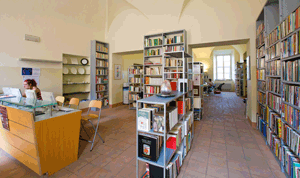
Library at Alma
Please tell me about ALMA’s library?
MM: The library was born at the same time as ALMA in 2004. I immediately donated my collection of books, magazines, films and cd-roms so that the school had a well equipped cultural space from its very start. Over the years the number of books and of other teaching materials has increased thanks to my purchases; today we can boast about having one of the best libraries on gastronomy in Italy.
How it is organized: by chef, by country, by region, by dish?
MM: ALMA’S library covers around a hundred different subjects. As of now pure cookbooks with recipes are in the minority. Literature, history and sociology books, books about a certain food product, about wine and hard liquor, children’s books, and essays on gastronomy and on the “green economy” prevail. All these different topics allow ALMA’s students to pursue a wide range of research topics.
Do the cookbooks only concern Italian cuisine?
MM: No, they concern the cuisines from around the world, but mostly the culture of gastronomy.
You have published many cookbooks; which did you enjoy writing the most and why?
MM: With La Gola, or The Throat published by Food Editore I won the Bancarella Prize for a book on gastronomy. It was a great honor to win this recognition; writing the book was fun for me.
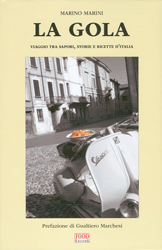 |
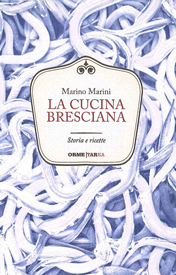 |
Are you writing another book now? If so, what is its working title and when will it be published?
MM: My Le Cucine di Parma, or The Cuisine of Parma has just come out and my La Cucina Bresciana, or Brescia’s Cuisine is forthcoming shortly; the publisher for both is Orme/Tarka. Next year my Nuovo Viaggio sul Po, or my New Trip on the Po River will be published by Plan in Florence: it’s a trip about life along this enormous natural resource, its little towns, their people, their crafts. Abused by the Italians, sometimes the Po rebels and takes revenge.
What region of Italy has the best cuisine and why?
MM: Not just one region, many. Each region or place has some extraordinary specialties like tortellini from Modena, lasagna from Bologna, brodetto or fish broth from the Marches, pizza from Naples, pesto from Genoa, and arancini, or rice balls from Sicily.
Up to now you’ve told me about Marino Marini the professional; I’d like to know more about Marino Marini the person. For example, what are your favorite foods?
MM: Spaghetti allo scoglio, or spaghetti with shellfish, lobster Thermidor, and skewers Bresican style.
A dish you dislike?
MM: Anything with artificial flavoring, that tastes synthetic.
Your favorite wines?
MM: All wines from Franciacorta, Lugana, Chiaretto di Garda, but also good beers.
I’ve read that parfaits are your favorite desserts; is that true?
MM: Yes, but also an ice cream “bomb” filled with vanilla ice cream.
Your favorite color?
MM: Amaranthine or dark reddish purple.
Your favorite flower?
MM: Tiger lilies.
Your favorite writer?
MM: Marguerite Yourcenar who said “Reacting and thinking like everyone else is never a guarantee and it is not always a justification.”
Your favorite book?
MM: Capital by Karl Marx, especially after I learned that Sarkozy kept a copy of it on his bedside table.
What zodiac sign are you?
MM: Cancer.
What is never missing in your home refrigerator?
MM: The light bulb.
What cuisine besides Italian is your favorite?
MM: A few dishes from Provence.
What foreign languages do you speak?
MM: Brescia’s dialect, and a bit of French, but I’m out of practice.
If you hadn’t become a chef, founder of Slow Food, author, book collector, and librarian, what other profession would you have chosen?
MM: I wouldn’t change a thing.
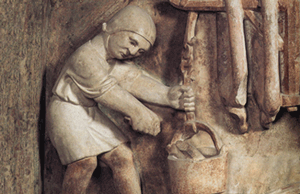 |
|
Bas-relief on the exterior of the cathedral of Parma, showing an artisan preparing salumi
|
& & &
